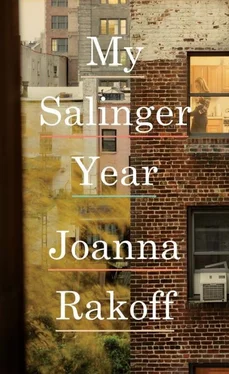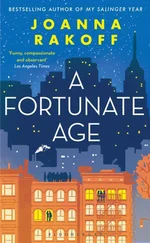Maybe you, like me, identified so strongly with Franny Glass, upon first reading, that you wondered if Salinger had somehow—through some sort of bizarre, science-fiction-style maneuver—tunneled into your brain. Or maybe you, like me, found yourself sobbing with recognition, with relief, that there was someone else who had felt such exhaustion, such despair, such frustration with everything, everyone, including yourself, your inability to be properly nice to your well-intentioned father, or your inexplicable ability to shred the heart of the man who loves you most. Someone else who was trying to figure out how to live in this world.
I understood now the various characters and places and questions the Salinger fans mentioned in their letters. The ducks in Central Park. Seymour Glass kissing Sybil’s foot. Phoebe. The red hunting cap. I understood now all the “goddam” and “helluva” and “bastard” and “crumb-bum.” And the effect was rather like finding the missing pieces of the jigsaw puzzle that has been sitting, half-finished, on your coffee table for months. Suddenly the full picture was clear.
It goes without saying, I suppose, that I now understood why the fans wrote to him, not just wrote to him but confided in him, confided in him with such urgency, with such empathy and compassion, with such confession . Because the experience of reading a Salinger story is less like reading a short story and more like having Salinger himself whisper his accounts into your ear. The world he creates is at once palpably real and terrifically heightened, as if he walked the earth with his nerve endings exposed. To read Salinger is to engage in an act of such intimacy that it, at times, makes you uncomfortable. In Salinger, characters don’t sit around contemplating suicide. They pick up guns and shoot themselves in the head. All through that weekend, even as I ripped through his entire oeuvre, I kept having to put the books down and breathe. He shows us his characters at their most bald, bares their most private thoughts, most telling actions. It’s almost too much. Almost.
And so, of course, his readers felt an urge to write back. To say this is where it hurts or here’s how you made it better .
But I also understood—I did, I did—why he didn’t want to receive those letters anymore. I thought, for the millionth time, of the boy from Winston-Salem. You can’t go around revealing your goddam emotions to the world . No, but you could reveal them to J. D. Salinger. You would presume he’d understand. And perhaps he would; perhaps he did. For years, Hugh told me, he’d tried to respond to his fans. But the emotional toll grew too great. It was, in a way, already too great for me.
Don came home on Monday, buoyant with energy, happy and rested, glad to see me. “How are you?” he said, sitting down beside me on the bed. I’d just finished Catcher and my head was spinning. “Tell me everything my Buba did.”
When I spoke, my voice was hoarse, as if I’d just woken up. I’d barely uttered a word all weekend, except to order my eggs and coffee. Outside, the sky was gray, utterly devoid of color. “Nothing,” I said.
“You didn’t go to the movies? I know how you love that.” He smiled, trying to cajole me into loquaciousness. I know you . A curious blankness, an apathy, had settled over me. I watched the sky darken, preparing for rain. I had, in Don’s absence, rather forgotten about him. I had not wondered what he was doing at the wedding, at the beach, if he was thrilled to be able to stare at the various young women in attendance without fear of my censure, if he had woken this morning with some blonde by his side. I had not really thought about him at all.
On Tuesday, my boss returned in full force, or with aspirations toward it. She had sold her apartment and was in the process of selecting another one. The front-runner had a sunken living room and beautiful views of the East River. She brought in plans and walked around the office unfurling them on our desks so that we might weigh in. We all agreed: the sunken living room looked lovely, elegant, like something out of a Carole Lombard movie.
She had also been to a spa in the days prior to her return, and she asked us, all of us, to feel her elbows, which had been thoroughly exfoliated for, she said, the first time in her life. “Feel my elbows!” she cried, when anyone asked about her trip. “Feel!” I felt, and as I felt, I thought of Seymour Glass, who writes in his journal about the imprints other people make on his hands, their humanity searing his flesh. “I have scars on my hands from touching certain people.” Seymour Glass, who is somehow too sensitive, too emotional—“quiet emotional”—for this world. Seymour Glass, who shoots himself in the head with a revolver, while his wife lies on the bed next to him.
One morning in September, James came over to my desk with his usual mug of coffee in hand. “So, I read Don’s novel again,” he said, looking at me intently. He was trying not to smile. “And I’d like to take it on. To take him on.”
“Really?” I said, rising so I was closer to his height. I had, I realized, been holding my breath while he spoke. “That’s amazing.”
“I’ll call him today and let him know. And we’ll send it out.” Raising his eyebrows, he allowed himself to smile.
“You won’t need him to do edits?” I asked, carefully modulating my voice so as to quell a rising panic. How could the novel go out as is? It wouldn’t sell. I knew it wouldn’t sell.
“Yeah, I’ve been thinking about it,” said James, taking a small sip of coffee. “And I think this is the kind of novel where an editor is either going to love his style or”—he grimaced—“not love it. There are changes he could make, but I think I may as well just get it out there, find an editor who loves it, and let him direct Don in a rewrite. There are a lot of directions you could go with an edit. I don’t want to send him in the wrong direction. I want someone to fall in love with his writing.”
I nodded.
“Why?” said James, his grin turning mischievious. “Do you think the novel needs a rewrite?”
“No!” I cried.
“Come on,” James said, laughing.
From my boss’s office came the squeak of her chair. “What’s going on out there?” she called.
“I’m taking on Joanna’s boyfriend,” James called back. Since the installation of the computer, he had developed an admirable ability to banter with my boss. Or perhaps she had developed the ability to banter with him, for he was no longer merely the junior-most agent—still tied to his Dictaphone and his filing—he was now the Computer Expert, the Agency’s conduit to the digital era.
“Really?” asked my boss. I heard the unmistakable flick of her lighter.
“Really. He’s written an interesting novel.” James rolled his eyes at me, anticipating my boss’s tart response, but none came. “Joanna thinks it needs work before I send it out.”
“She’s probably right,” said my boss with a laugh. A moment later, a stream of smoke came swirling out her door, like the trail from a genie’s lamp.
The drama over “Hapworth” moved from the inside of the book—the leading, the margins, the running heads—to the outside. Roger had encountered a glitch: despite the ample space he’d given the lines, despite the wide margins, the book was still not thick enough for the title—or Salinger’s name, for that matter—to be stamped horizontally across its spine. “The letters run together,” he told me, worriedly. “It becomes a blur. It just looks terrible .”
Salinger was displeased by this, of course, but he understood that Roger could do nothing about it. He decided to take matters into his own hands: he came up with a design for the spine himself. One entire day in October was lost to a flurry of faxing: Jerry faxing my boss designs. My boss looking them over, then faxing them to Roger, who made changes and faxed them back to us. And on and on. My boss did the faxing herself, running back and forth to the machine, which was just beyond the finance wing, catty-corner from the computer, adjacent to the coffeemaker and the photocopier and the microwave, the various reminders that this was 1996 rather than 1956.
Читать дальше












